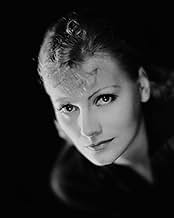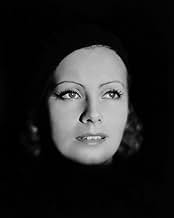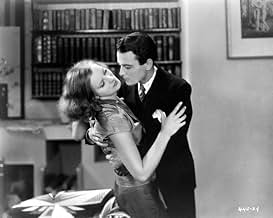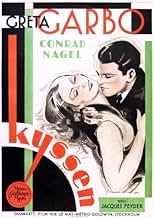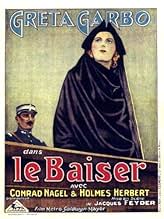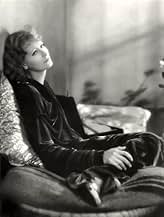AVALIAÇÃO DA IMDb
6,8/10
1,3 mil
SUA AVALIAÇÃO
Adicionar um enredo no seu idiomaAn unhappily married woman is caught up in scandal and murder when her affection toward a young man is misinterpreted.An unhappily married woman is caught up in scandal and murder when her affection toward a young man is misinterpreted.An unhappily married woman is caught up in scandal and murder when her affection toward a young man is misinterpreted.
- Direção
- Roteiristas
- Artistas
Symona Boniface
- Gossip in Museum
- (não creditado)
Allan Cavan
- Prison Warden
- (não creditado)
André Cheron
- Prosecutor
- (não creditado)
Carrie Daumery
- Party Guest
- (não creditado)
Ruth Feldman
- Scrubwoman
- (não creditado)
Lee Phelps
- Tour Guide
- (não creditado)
Philip Sleeman
- Lounge Lizard
- (não creditado)
- Direção
- Roteiristas
- Elenco e equipe completos
- Produção, bilheteria e muito mais no IMDbPro
Avaliações em destaque
Greta Garbo's last silent film finds her unhappily married to Andres Randalf, tearfully fending off the advances of old boyfriend Conrad Nagel and letting young and callow Lew Ayres steal A Kiss from her. Ayres is the son of Holmes Herbert who is her husband's business partner complicating things even more.
You can't blame Ayres though. In that last silent film Garbo is certainly at her most alluring and she carries the film off beautifully.
Ayres is thinking with his male member and he's at an age where there is more tendency to do that. When Randalf catches him with Garbo he starts beating on the kid as any jealous husband would. He gets shot for his troubles and Garbo is arrested. She also shields young Ayres telling him to leave the premises.
This is where Nagel comes in. Even without dialog as per usual in a courtroom scene he does well in putting over the dramatic impact of the trial. All actors love courtroom drama and Nagel gets some good innings in here.
I have to say though, French forensics leave a lot to be desired if they are manipulated in the way they are.
In the hands of a lesser actress The Kiss would have been melodramatic claptrap. But Garbo can make anything look positively poetical.
You can't blame Ayres though. In that last silent film Garbo is certainly at her most alluring and she carries the film off beautifully.
Ayres is thinking with his male member and he's at an age where there is more tendency to do that. When Randalf catches him with Garbo he starts beating on the kid as any jealous husband would. He gets shot for his troubles and Garbo is arrested. She also shields young Ayres telling him to leave the premises.
This is where Nagel comes in. Even without dialog as per usual in a courtroom scene he does well in putting over the dramatic impact of the trial. All actors love courtroom drama and Nagel gets some good innings in here.
I have to say though, French forensics leave a lot to be desired if they are manipulated in the way they are.
In the hands of a lesser actress The Kiss would have been melodramatic claptrap. But Garbo can make anything look positively poetical.
In Lyons, Irene Guarry (Greta Garbo) is not happy with her marriage with the old businessman Charles Guarry (Anders Randolf) and is in love with the young lawyer André Duball (Conrad Nagel). Irene knows that the jealous Charles will never give the divorce to her; therefore they decide to stop seeing each other since she does not want to be an unfaithful wife and defy the convention. André also decides to move to Paris. One day, Irene knows the eighteen year-old college student Pierre Lassalle (Lew Ayres) in a party during his vacation and she learns that the youngster is infatuated with her. By the end of his vacation, Pierre asks a photo for Irene and she promises to give one to him. Meanwhile Charles has a meeting with Pierre's father Lassalle (Holmes Herbert) and discloses that he is on the verge of bankruptcy. Lassalle promises to help his friend and they schedule a meeting in the night. When Charles goes to the encounter, Pierre arrives at his home and asks for a goodbye kiss to Irene. Meanwhile Charles does not feel well and returns home, witnessing their kiss. Charles tries to kill Pierre and later the student arrives home and tells his father that Charles is dead. Irene is arrested accused of murdering her husband. What happened in Charles's office?
"The Kiss" is a melodramatic romance and the last MGM and Greta Garbo's silent film and the debut of Lew Ayres. The movie has beautiful shots, a mystery and Greta Garbor extremely beautiful. Despite being a silent film, MGM uses sound technology with a powerful orchestral soundtrack. My vote is seven.
Title (Brazil): "O Beijo" ("The Kiss")
"The Kiss" is a melodramatic romance and the last MGM and Greta Garbo's silent film and the debut of Lew Ayres. The movie has beautiful shots, a mystery and Greta Garbor extremely beautiful. Despite being a silent film, MGM uses sound technology with a powerful orchestral soundtrack. My vote is seven.
Title (Brazil): "O Beijo" ("The Kiss")
"The kiss" took the melodramatic accents of Feyder 's precedent work " Les Nouveaux Messieurs"and tightened them up;whereas that work should have been boiled down to a 90 min movie, "the kiss" depicts a tragedy in admirably succinct style :only 62 min,a very good screenplay which does not reveal the whole truth before the last minutes.It's the classic story of the divine lady married with a graybeard without love ,in love with a more handsome gent;add a young man,pretending to be a man (the subject of the immature young lad will come back later in Feyder 's career in " Pension Mimosas")and all the ingredients of a good melodrama are in it.
In Hollywood,Feyder accurately depicted his native land:in jails for women ,the wardens were nuns (in 1960 ,in Clouzot's "La Vérité" ,Brigitte Bardot was guarded by sisters too);and the gendarmes' uniforms are exactly as they were.
After this successful work (which owed a lot to G.Garbo in her last silent movie) ,Feyder was disappointed with the screenplays left for him to direct and he came back to his native land and produced his greatest achievements :"Le Grand Jeu" ,"Pension Mimosas" and his masterpiece "La Kermesse Héroique".
In Hollywood,Feyder accurately depicted his native land:in jails for women ,the wardens were nuns (in 1960 ,in Clouzot's "La Vérité" ,Brigitte Bardot was guarded by sisters too);and the gendarmes' uniforms are exactly as they were.
After this successful work (which owed a lot to G.Garbo in her last silent movie) ,Feyder was disappointed with the screenplays left for him to direct and he came back to his native land and produced his greatest achievements :"Le Grand Jeu" ,"Pension Mimosas" and his masterpiece "La Kermesse Héroique".
The Kiss (1929) was the final silent film produced by Metro-Goldwyn-Mayer. It was also the final silent film of stars Greta Garbo and Conrad Nagel.
The subtle acting and sophisticated (and purely visual) storytelling show how far silent cinema had come by the late 1920s. When talkies took over Hollywood, the acting regressed back to that of the stage, the background music was replaced with static hiss, and even basic film-making techniques were restrained due to the sound equipment. It would take a few years for sound technology to grow in sophistication.
Removed from its distinction as the end of an era, The Kiss is an average melodrama, especially for Garbo, who plays an unhappily married woman in love with another man. She looks luminous and acts completely with her eyes, her brilliance showing through even in material such as this. Conrad Nagel is competent in an unchallenging role, and Lew Ayres is simultaneously adorable and somewhat sinister as the young man smitten with Garbo.
The big twist is predictable and the recorded score is cheesy, using Tchaikovsky's Romeo and Juliet theme as the lovers' leitmotif, but overall, this is a skillfully made bit of melodramatic fluff, the last gasp of MGM's silent output.
The subtle acting and sophisticated (and purely visual) storytelling show how far silent cinema had come by the late 1920s. When talkies took over Hollywood, the acting regressed back to that of the stage, the background music was replaced with static hiss, and even basic film-making techniques were restrained due to the sound equipment. It would take a few years for sound technology to grow in sophistication.
Removed from its distinction as the end of an era, The Kiss is an average melodrama, especially for Garbo, who plays an unhappily married woman in love with another man. She looks luminous and acts completely with her eyes, her brilliance showing through even in material such as this. Conrad Nagel is competent in an unchallenging role, and Lew Ayres is simultaneously adorable and somewhat sinister as the young man smitten with Garbo.
The big twist is predictable and the recorded score is cheesy, using Tchaikovsky's Romeo and Juliet theme as the lovers' leitmotif, but overall, this is a skillfully made bit of melodramatic fluff, the last gasp of MGM's silent output.
As a fan of Greta Garbo films, I consider each one of them highly entertaining and worth seeking out. The Swedish beauty could captivate the viewer in many of her roles to such extend that she was as popular in movie world as, much later, the Swedish band ABBA was in music world. Yet, when I talk to people who are quite knowledgeable about the early cinema, I usually encounter the opinion that Garbo films let them down. "She was such a dramatic lady," they say "she can still make us cry."
Strange as it may occur, to some extend, this pretentious opinion may be found accurate, particularly when we consider the year 1939 and Garbo's first comedy NINOTCHKA made by Ernst Lubitsch. What a change, what a revelation it was! "A true transformation," some said and indeed, NINOTCHKA proved Garbo's talent in comedy (unfortunately forever bound to fail two years later in TWO FACED WOMAN). But few people know that Garbo had wonderfully modern roles in some other films, roles that can still make your day thanks to their charm and convincing portrayals. One of such films is THE KISS with original musical score, the last silent movie of Garbo and MGM directed by Jacques Feyder with whom Garbo worked later on the German version of "Anna Christie" with Salka Viertel. The uniqueness of THE KISS is the fact that it is very different from all other Garbo films.
The kiss of 'good bye' that cost Irene Guarry (Greta Garbo) so much (which was metaphorically Garbo's farewell to silents) is the representation of all human struggles and desires. Simple as the short story may seem, when you watch the film carefully, you realize that the director aimed at conveying some important and a very up-to-date message for all of us: "Listen to your heart not the tyrants of conventions and misery of duties..." There is a bit of everything in the story: wit, romance, jealousy, pardoning... Consider, for instance, the sequence at the court where we get the masterwork of human situation, individual situation in the mute world.
The film can boast terrific artistic merits with scenes of exceptional charm. Here, a mention must be made of the party at Lasalle, which again proves the glamor of the silent era. But, most things we can appreciate here are there thanks to the Swedish Sphinx... Garbo. The great Greta gives another brilliant performance in the lead but, as it has already been mentioned, her role differs from other of her silent roles in the way that Irene Guarry appears to be a particularly modern character as well as her story appears to be extremely appealing to modern audience. It is not as much her vehicle as the story which captivates certain viewers. That, however, does not mean that we easily forget the great actress whose presence illumines the moments and supplies them with unique power. There are exceptional shots of Garbo's face. Consider, for instance, the moment she looks at herself in the mirror. Perhaps not as great as the ultra famous moment in FLESH AND THE DEVIL but also highly worth attention. What a great beauty she was!
So to speak, THE KISS is a very important movie in both Garbo's career and the history of MGM. It occurs to be a great farewell to the silent era, an interesting look at life situation filled with the affection that any kiss deserves... And for Garbo fans somewhere there in the world: a different look at the famous Swede, yet, unique and magnetic as always.
Strange as it may occur, to some extend, this pretentious opinion may be found accurate, particularly when we consider the year 1939 and Garbo's first comedy NINOTCHKA made by Ernst Lubitsch. What a change, what a revelation it was! "A true transformation," some said and indeed, NINOTCHKA proved Garbo's talent in comedy (unfortunately forever bound to fail two years later in TWO FACED WOMAN). But few people know that Garbo had wonderfully modern roles in some other films, roles that can still make your day thanks to their charm and convincing portrayals. One of such films is THE KISS with original musical score, the last silent movie of Garbo and MGM directed by Jacques Feyder with whom Garbo worked later on the German version of "Anna Christie" with Salka Viertel. The uniqueness of THE KISS is the fact that it is very different from all other Garbo films.
The kiss of 'good bye' that cost Irene Guarry (Greta Garbo) so much (which was metaphorically Garbo's farewell to silents) is the representation of all human struggles and desires. Simple as the short story may seem, when you watch the film carefully, you realize that the director aimed at conveying some important and a very up-to-date message for all of us: "Listen to your heart not the tyrants of conventions and misery of duties..." There is a bit of everything in the story: wit, romance, jealousy, pardoning... Consider, for instance, the sequence at the court where we get the masterwork of human situation, individual situation in the mute world.
The film can boast terrific artistic merits with scenes of exceptional charm. Here, a mention must be made of the party at Lasalle, which again proves the glamor of the silent era. But, most things we can appreciate here are there thanks to the Swedish Sphinx... Garbo. The great Greta gives another brilliant performance in the lead but, as it has already been mentioned, her role differs from other of her silent roles in the way that Irene Guarry appears to be a particularly modern character as well as her story appears to be extremely appealing to modern audience. It is not as much her vehicle as the story which captivates certain viewers. That, however, does not mean that we easily forget the great actress whose presence illumines the moments and supplies them with unique power. There are exceptional shots of Garbo's face. Consider, for instance, the moment she looks at herself in the mirror. Perhaps not as great as the ultra famous moment in FLESH AND THE DEVIL but also highly worth attention. What a great beauty she was!
So to speak, THE KISS is a very important movie in both Garbo's career and the history of MGM. It occurs to be a great farewell to the silent era, an interesting look at life situation filled with the affection that any kiss deserves... And for Garbo fans somewhere there in the world: a different look at the famous Swede, yet, unique and magnetic as always.
Você sabia?
- CuriosidadesMGM's last non-talking picture.
- Erros de gravaçãoIn the opening credits, the name André, Conrad Nagel's character, is spelled "Ardré."
- Versões alternativasMGM also released this movie without a soundtrack, as a totally silent film.
- ConexõesFeatured in MGM Parade: Episode #1.30 (1956)
Principais escolhas
Faça login para avaliar e ver a lista de recomendações personalizadas
- How long is The Kiss?Fornecido pela Alexa
Detalhes
Bilheteria
- Orçamento
- US$ 257.000 (estimativa)
- Tempo de duração1 hora 2 minutos
- Mixagem de som
- Proporção
- 1.33 : 1
Contribua para esta página
Sugerir uma alteração ou adicionar conteúdo ausente



